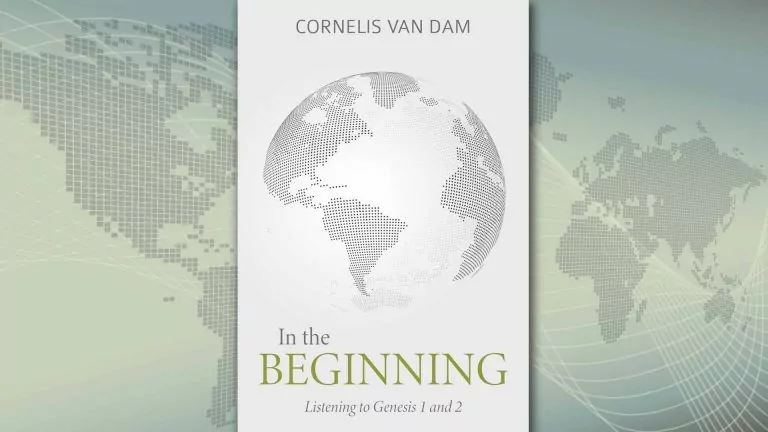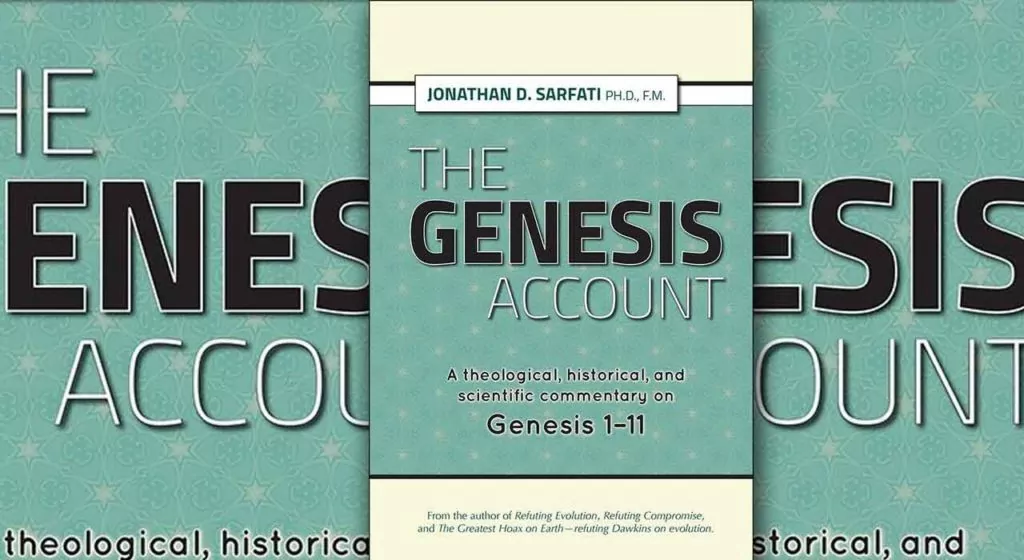by Cornelis Van Dam
2021 / 371 pages
Dr. C. Van Dam begins his latest book by explicitly laying out his presuppositions. He’s upfront about his non-negotiable assumptions and biases. As I review his book, it’s appropriate that I share mine too. I share his presuppositions about Scripture as the trustworthy Word of God, but I also bring a personal bias to the table. Back in the day, Van Dam was my Old Testament professor at the Canadian Reformed Theological Seminary. I had an affectionate nickname for him in view of his ability to put the smack-down on unbelieving or shoddy scholarship: “Wham-Bam-Van-Dam.” This was always said with the greatest admiration for Dr. Van Dam. As a seminary professor, he was nothing if not thorough and careful.
Far more than a commentary
This new book exhibits that same kind of comprehensive and precise approach to the two opening chapters of Scripture. Van Dam leaves no stone unturned. In the Beginning is an exhaustive treatment not only of the meaning of these two chapters, but also the various challenges that have been raised in Old Testament scholarship regarding them. What you’re looking at here is not just a commentary on Genesis 1-2, but far more.
Over the last decade or so John Walton has become well-known for his views on the early chapters of Genesis. Walton argues that we often misunderstand Genesis 1-2 because we don’t take into account the ancient Near Eastern context of these chapters. Once we do that, says Walton, then we can see that Genesis 1-2 was never meant to be taken literally as history. The history can then be filled in with what science teaches us, including what science says about human origins. In chapter 2 of In the Beginning, Van Dam discusses Walton’s views at length and explains how and where they fail to do justice to the character of Scripture as the Word of God. In my view this is the most important chapter of the book.
A sampling
To whet your appetite further, let me share a selection of questions that Dr. Van Dam answers elsewhere in the book:
- Can new scientific data be regarded as general revelation given by God?
- What is the relationship of Scripture to science? Is Scripture a scientific textbook?
- Can geology give us a history of creation?
- Was Herman Dooyeweerd faithful to Scripture in his view of origins?
- How are we to evaluate Meredith Kline’s Framework Hypothesis?
- Did the ancient Israelites believe that heaven was a solid vault above us?
- Why is there no mention of evening and morning with the seventh day in Genesis 1?
- What does Scripture mean when it says that God created through his Son?
- Can the breath of life in Genesis 2:7 be equated with the Holy Spirit?
- Was there animal death before the fall into sin?
- Why did God create everything with an appearance of age? Was he being deceptive in so doing?
Those are just a few of the questions answered. There are far more. What I appreciate about Van Dam’s answers is that he bases them on what Scripture says. He doesn’t want to go beyond Scripture and so he’ll sometimes say, “Scripture doesn’t say more than this – this is as far as we can go.”
A point of disagreement
If I would venture some respectful disagreement, it would be in the final chapter where the author briefly discusses whether there’s a need for new confessional formulations to address the challenges of evolution. In 2014-15, I was involved with an effort to add some clarification to article 14 of the Belgic Confession in the Canadian Reformed Church. That effort was ultimately unsuccessful. I don’t regret having made the effort, nor do I think it unnecessary to this day.
Van Dam argues that Scripture is clear and our “confessions faithfully reflect that testimony.” However, that fails to account for those who have argued that the Three Forms of Unity provide the latitude needed to hold to forms of theistic macro-evolution. Their arguments have persuaded some. This wiggle-room ought to be addressed, especially if there is openness to theistic macro-evolution in your churches.
Van Dam also posits that:
“A difficulty with preparing a new formulation asserting the historicity of Genesis 1 and 2 is the temptation to go beyond what Scripture says, in other words, to provide specifics about that which Scripture gives no additional detail.”
The proposal to add clarification to BC 14 was to state what Scripture states: that Adam was created from dust (Gen. 2:7) and Eve from Adam’s side (Gen. 2:21-22). As a consequence: “They were created as the first two humans and the biological ancestors of all other humans. There were no pre-Adamites, whether human or hominid.” If one thinks that this infringes upon the freedom of exegesis, then one is willing to grant the latitude for theistic evolutionary accounts of human (and other) origins.
Conclusion
That criticism notwithstanding, In the Beginning was a delight to read – personally it brought me back to many of the OT lectures I enjoyed from Dr. Van Dam in my seminary years. While enjoyable, it could be tough-going at times for some. It’s not highly technical, but in places Van Dam does go academic. It’s not a book you’d necessarily be giving out as gifts to those doing profession of faith. It would, however, be a great gift for someone doing post-secondary studies, whether in the sciences or in the humanities. And it’s definitely a recommended read for those who’ve completed such studies.
Dr. Bredenhof first posted this review to CreationWithoutCompromise.com, a blog “promoting the biblical understanding of origins” and it is reprinted here with his permission. For an even more in-depth review, check out Martin Williams’ “Genesis: No Room for Theistic Evolution” at Creation.com.













